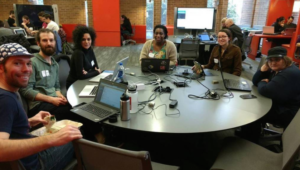 Online volunteers aren’t always remote; hackathons and Wikipedia edit-a-thons bring together people in the same physical space, at the same time, to volunteer online, to code for good, to create content for the arts or under-represented groups or science topics on Wikipedia, and now, to preserve critical scientific data that is under threat by the new Presidential administration in the USA.
Online volunteers aren’t always remote; hackathons and Wikipedia edit-a-thons bring together people in the same physical space, at the same time, to volunteer online, to code for good, to create content for the arts or under-represented groups or science topics on Wikipedia, and now, to preserve critical scientific data that is under threat by the new Presidential administration in the USA.
ProPublica found that the new administration edited an educational website for kids to significantly downplay the negative impacts of coal. The White House also removed all of the data from its portal of searchable federal data. The site previously included data on everything from budgets to climate change to LGBT issues. It now displays a message telling people to: “Check back soon for new data.” Staff under the new Secretary of Education have deactivated the Individuals with Disabilities Education Act (IDEA) web site. You can still see it at http://www.archive.org. That archived version is packed with information for parents of children with disabilities. If you go to the new web site, however, you’ll see a greatly-scaled back web site, with a lot of information no longer available.
Groups are organizing through traditional social tools like Twitter and Facebook to help preserve information before it disappears and to retrieve information removed from official government web sites.
This 25 February 2017 story on the CNN web site, Why Trump’s election scares data scientists, talks about Data Refuge, which was founded after the election with a goal of tracking and safeguarding government data. The volunteer group of hackers, writers, scientists and students collects federal data about climate change in order to preserve the information and keep it publicly accessible. In the past three months, Data Refuge has hosted 17 events where hundreds of volunteers learn how to copy and publish research-quality data. The group, which grew out of the Penn Program in Environmental Humanities, also monitors scientific research that depends on government funding because there’s concern this could dry up.
One platform, data.world, is a social network exclusively for people who want to find and collaborate on building data sets, much like how programming site GitHub lets coders collaborate on building apps. It already has tens of thousands of open government data sets available.
This 13 February 2017 Wired.com story, Diehard Coders Just Rescued NASA’s Earth Science Data, talks about volunteers coming together across the USA to preserve online scientific information and other info they fear will be permanently removed from government web sites under the Trump administration, and building systems to monitor ongoing changes to government websites. By the end of one day, one group had collectively loaded 8,404 NASA and DOE webpages onto the Internet Archive, effectively covering the entirety of NASA’s earth science efforts. They’d also built backdoors in to download 25 gigabytes from 101 public datasets, and were expecting even more to come in as scripts on some of the larger dataset finished running.
But there is still much work to do. “Climate change data is just the tip of the iceberg,” says Eric Kansa, an anthropologist who manages archaeological data archiving for the non-profit group Open Context. “There are a huge number of other datasets being threatened with cultural, historical, sociological information.” A panicked friend at the National Parks Service had tipped him off to a huge data portal that contains everything from park visitation stats to GIS boundaries to inventories of species.
Some of these efforts on Twitter:
@SeattleDataResQ (the photo above is from Seattle’s hackathon – used with permission)
Also see:
Advice for and examples of One(-ish) Day “Tech” Activities for Volunteers
Hackathons for good? That’s volunteering!
Where are the evaluations of hacksforgood/appsforgood?
Open Air Hackathon – Nonprofits Get Web Sites, Designers Get Accessibility Training
Wikipedia needs improvement re: volunteerism-related topics
 The Last Virtual Volunteering Guidebook, by Susan J. Ellis and myself, is our attempt to document all the best practices of working with online volunteers, from the more than three decades that virtual volunteering has been happening. It’s available both in traditional print form and in digital version. Thanks to everyone who has purchased it so far! Bonus points if you can find the sci fi/fan girl references in the book…
The Last Virtual Volunteering Guidebook, by Susan J. Ellis and myself, is our attempt to document all the best practices of working with online volunteers, from the more than three decades that virtual volunteering has been happening. It’s available both in traditional print form and in digital version. Thanks to everyone who has purchased it so far! Bonus points if you can find the sci fi/fan girl references in the book…
